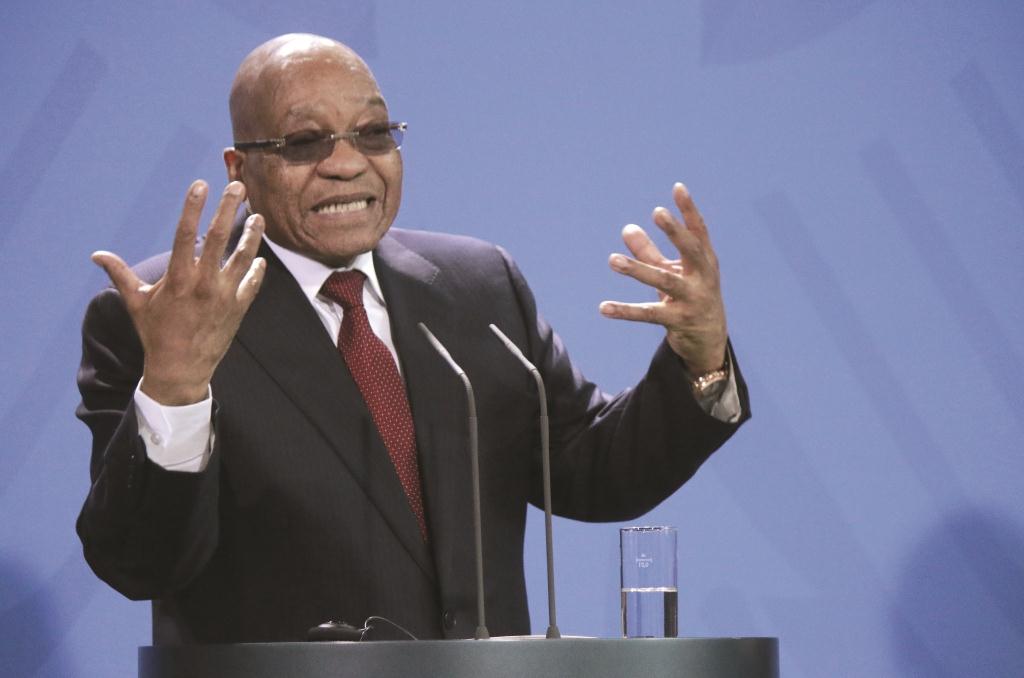South Africa’s President Jacob Zuma desperately tried, but failed, to block the release of the public protector’s report that implicated him, several politicians, and state-owned enterprises, in the so-called state capture saga.
In the same week that controversial fraud charges against the Minister of Finance Pravin Gordhan were dropped, the president and two of his ministers were dealt with a sickening blow by the North Gauteng High Court in Pretoria. On November 1, Judge Dunstan Mlambo struck off the roll the application of the Minister of Cooperative Governance and Traditional Affairs, David van Rooyen. Minister of mineral resources, Mosebenzi Zwane, and Zuma also failed to have the report interdicted. Zuma’s lawyers withdrew their application and the judge ordered the office of the Public Protector to release the report in a few hours.
The report implicated Zuma, several ministers, and some businessmen, in colluding in state capture with the Gupta family. Brothers Ajay, Atul, and Rajesh Gupta, from India, have numerous business interests in South Africa.
Former Public Protector, Thuli Madonsela, had planned to release the report on October 14, her last day in office, but Zuma’s lawyers applied for an interdict to prevent the report being released.
In a television interview soon after the state capture report was released, former South African president, Thabo Mbeki, said he believes Zuma will respect the law.
“I would like to imagine the president, like everybody in the country, would take the report seriously, study it as the presidency has suggested. Study it closely with the view to taking whatever action might be necessary. I don’t know what it would be, but it must be based on assessment of what the Public Protector has said and the implication of those statements if they are indeed correct,” said Mbeki.
In 2005, Mbeki suspended Zuma, who was the Deputy President at the time. Zuma was accused of having a corrupt relationship with his former financial advisor, Schabir Shaik. Although the charges against Zuma were dropped, Judge Hilary Squires found the two had a “generally corrupt relationship” and Shaik went to prison.
Zuma dodged serious charges then. Will he be able to repeat the trick after the state capture report? The Public Protector stated that Zuma must appoint a judicial inquiry within 30 days to investigate the allegations. Zuma, however, says he plans to go back to court to challenge the report. He says it is inconclusive and needs to be reviewed by him.
Prince Mashele, a political analyst and senior researcher at the Centre for Politics and Research at the University of Pretoria, says the African National Congress (ANC) missed a golden opportunity to fire Zuma when the Constitutional Court ruled he had misused state funds to upgrade his Nkandla homestead.
“The report is a clear indication that South Africa is run by a corrupt government and people who join politics to enrich themselves at the expense of citizens. This is a simple message to the rest of the world that we are no different from the rest of the continent. This doesn’t put us in a positive light. During the tenure of Presidents Mandela and Mbeki we gave the impression that we were different, but Zuma has confirmed the stereotypes that we cannot run our countries,” he says.
Mashele says he cannot imagine the ANC repairing its dented imagine before the national elections in 2019.
“The ANC is doomed. They can only go down. Come 2019, if they are winning the elections, they can only do that with a small margin. They have been constantly losing the people’s support. I won’t be surprised if the people dump them for the opposition,” says Mashele, is the author of The Death of Our Society and co-author of The Fall of the ANC: What Next?.
Scathingly, Mashele says we must all thank Zuma for revealing our true African character, that the idea of the rule of law is not part who we are, and that the constitution is a concept far ahead of us as a people.
“How else are we to explain the thousands of people who flock to stadiums to clap hands for a president who has violated their country’s constitution?”
“Now that we have reclaimed our place as another African country, we must reflect on, and come to terms with, our real character and imagine what our future portends,” says the despondent Mashele.
Unless a credible and independent investigation into the state capture allegations takes place, that future could be bleak.
